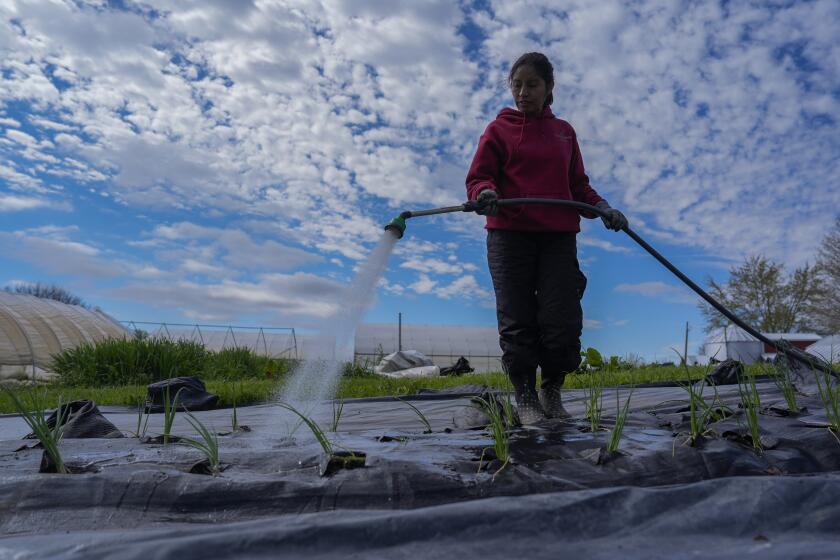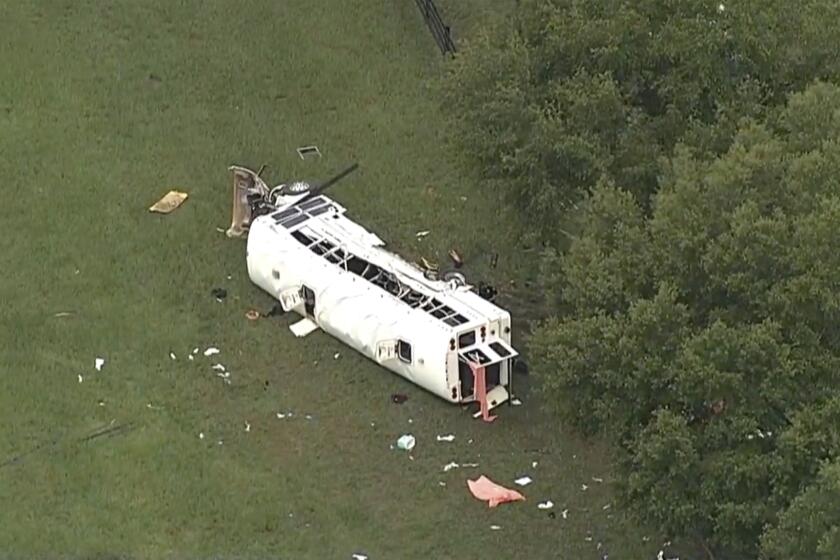Russia’s Harvest of Have-Nots
When he was arrested with his three older brothers for kicking a tramp to death, 10-year-old Volodya Yakovlev was still a round-faced kid from a problem family in deprived outer Moscow.
Despite his confession, Volodya’s innocent smile and sweet treble voice made the 1994 crime seem unbelievable. Police and courts blamed his oldest brother, who was then 14, for instigating the violence. Volodya was not punished, although he was later separated from his mother and sent to a state children’s home.
Now, however, after three years of brutalizing “care” by local authorities, Volodya has started to look like a hardened criminal. Tall, gangling, shaven-headed and perpetually grinning, he boasts between cigarettes about his lock-picking expertise, thefts, truancy and multiple arrests.
His future? More crime, he says. At 13, it’s too late for anything else.
“Jobs? No way. And I won’t be bothering with military service, either,” Volodya says in brutal street speak. “There’s nothing to do. The army wouldn’t take me with my record. Anyway, there’s nothing to steal there.”
The story of Volodya Yakovlev bears chilling witness to the way Russia’s grim social institutions--orphanages, children’s homes, reform schools, the army and, later, prisons--fail in their stated aim of creating order in society. Instead, a mix of official neglect and excessive severity at these institutions actually encourages the formation of an angry and alienated underclass, with no way of surviving except through crime and violence.
Social workers and human rights activists are unanimous in saying that the best way to get rid of Russia’s criminal underclass is not to attack the violent victims of society who make it up--but the state officials whose negligence and greed create it. They accuse the chinovniki, the self-serving class of invisible bureaucrats who channel funds from budgets to institutions, of cynically perpetuating an abusive system that does little to correct wrongdoing or foster civic virtues--for no other reason than to line its own pockets.
For children such as Volodya, one step into this system can become a life sentence. Horrifying statistics cited by activist Boris Altshuler, head of a children’s rights program, reveal that the 200,000 youths in state homes are likelier than others to inflict violence in the future.
“Every year, 15,000 to 17,000 of these kids are released into the real world at 18. But they’re completely institutionalized. They can’t handle normal life,” Altshuler says. “So, in their first year of freedom, 5,000 of these kids go to prison, 3,000 become tramps and 1,500 commit suicide.”
Brothers Beat Man Until He Dies
Volodya’s story is typical. The attack on the 60-year-old tramp took place in 1994, in a badly lighted underpass next to McDonald’s in central Moscow. As he told it at the time, he and three of his brothers asked the man for a cigarette. When the tramp kicked at Volodya, the four brothers, ages 10 to 14, “defended themselves” by beating the old man until they realized he was dead. Then they called an ambulance.
Only the 14-year-old brother was officially deemed old enough to be punished. He was sent to a juvenile penitentiary. Volodya’s mother insisted that her younger children had done nothing wrong.
Disturbingly, however, while in detention, the Yakovlev boys also claimed to have killed five other people at railway and subway stations around Moscow.
Indifferent police refused to investigate the claims, insisting that the children must have made them up. But no counseling or social help was given to help establish what might have caused them to make such claims.
The local school refused to have any more to do with the Yakovlevs. So Volodya and his brothers carried on roaming the streets, stealing. When his mother, Svetlana, the mentally ill widow of a violent and alcoholic husband who died in 1992, was taken to a mental hospital, Volodya also ended up in local authority care.
Like the other kids in the children’s home, Volodya lives under surveillance. But it’s the weekend, and he’s done what he does most weekends--slipped through a hole in the wire fence and headed off into the real world. No one bothers to mend the wire, he says with a shrug. Why would they?
Either he goes to the center of Moscow to get some money by begging, picking pockets or mugging, or he returns to the apartment where he was raised.
“He stays here till he steals something. Then, if they feel like it, the police come around and take him back,” explains his sister Nika, a 21-year-old unemployed shop assistant who shrugs after the explanation.
Volodya is one of seven siblings. In theory, three of them are currently locked up. But they come home to the filthy apartment whenever they escape from prison or reform school. There’s always someone in the ninth-floor apartment--papered with girlie-magazine nudes--to feed meat to the caged black rat with the foot-long tail, the terrified cat, a parrot and a muzzled pit bull terrier.
What the Yakovlevs live on is unclear. They laugh when asked. But the anger that emanates from the forsaken boys is palpable. Their speech is underworld jargon, all swagger and swear words. Lyosha, the oldest boy and at 20 an ex-convict, carries a flick knife.
That anger, psychologist Nina Yuditseva says, is the legacy of brutal Russian state care in a society that doesn’t understand the notion of rehabilitation--for all the orphans and juvenile offenders she sees.
“People who come out of any kind of state child care here are alienated and don’t believe they or anyone else have any value,” she says. “Their emotions aren’t awakened, and they can’t become fully integrated people.
“When you get them to draw you pictures, kids from homes draw war, rape, chaos, blackness, horrors. The pictures often have no people in them. The main feature of their drawings is fear, and aggression to protect themselves.
“They’ve lived up to 10 years in these homes. What social adaptation can be expected?”
Brutal Hazing, Suicide Part of Military Life
Top among the other Russian institutions that produce graduates headed for crime is the army. Russia’s vast and poverty-stricken armed forces number nearly 1.5 million, most of them reluctant conscripts younger than 27. Under the law, they must serve for two years.
Those with strings to pull--a friend in high places, or just enough money for bribes--get their sons excused from the army. The stories of vicious hazing, starvation, suicide and murderous rampages through garrisons are too frequent and disturbing for any concerned parent to do anything else.
Those who are unable to think up ways to dodge the draft legally tend to be orphans and the children of the poor. Once called up in a twice-yearly conscript intake of, in theory, 190,000, they run away in droves--thereby breaking the law and laying themselves open to arrest and imprisonment.
According to Valentina D. Melnikova, head of the Soldiers’ Mothers Committee, an organization that campaigns to protect the rights of the young soldiers and keep them safe, every year 2,000 runaway conscripts knock on her door with complaints of sadistic bullying, theft, hunger and illness.
Even those who complete their service are at risk in society, she says. They face alcoholism, stress-related illness and a high failure rate in marriage: “Boys who do make it through military service have post-traumatic stress from being trapped in a desperate situation for so long. They’re anxious, and they’re trying to restore the balance in their lives. They very often marry the first girl who comes along, a thoughtless marriage, an attempt to escape their loneliness. Or they take to the bottle.
“The ones who fought in the war in Chechnya are the worst off. Everyone knows they came back with huge psychological stress. No one wants to give them a job. It’s virtually impossible for them to get work.”
For many, prison is the end of the line. In Russia, prison means years of darkness, unbearable heat, overcrowding and exposure to the deadly tuberculosis that infects nearly half the inmates of the prison system.
“Our state criminal policy is cruel and arbitrary,” says Valery Abramkin, head of the Moscow Center for Prison Reform. “The severity of sentencing is out of proportion to the severity of the crime. People who steal a loaf of bread because they’re unemployed and hungry get three to four years in jail.
“Because it’s official policy to liquidate marginal groups, about 40% of the people in prison have done nothing worse than be rounded up for being homeless. Our prisons are the theater of the absurd.”
He added: “A lot of people of employable age get locked up unnecessarily. Then their kids suffer--and the vicious cycle moves on to the next generation.”
Crime From Different Quarters
In modern America, there are 565 convicts per 100,000 people; in Russia, there are 780. A perception that Russia is in the grip of a crime wave is only partially borne out by government statistics. These show the total number of reported crimes falling--from 2,760,652 in 1992 to 2,397,311 in 1997. But the number of “underclass” crimes--murders, robberies and random street violence--has risen, as have the numbers of crimes committed by drunk people.
This violent crime by have-nots is unconnected to the “glamour” end of illegality in Russia--the high-powered organized crime that has emptied government coffers, allowed shadowy tycoons to share economic spheres of influence, and led to the assassinations of meddlesome bankers.
“Three-quarters of the people involved in crime are the educated ones in some kind of organized activity,” says Vladimir Grib of the Interior Ministry’s Laboratory for Analyzing Organized Crime. “Then there’s the rest: the people we call ‘the Frostbitten.’ They’re from institutions, orphanages, prisons, the unwanted veterans of Afghanistan or Chechnya--the aimlessly violent, people who have lost their direction in life.”
Even organized-crime bosses find random violence distasteful, he says.
“These people are as much of an irritant to the intelligentsia of the crime world as to the forces of law and order. There are even stories about organized-crime bosses ordering cleanups of towns to get rid of them. The down-and-outs of crime are hated by everyone.”
But the blame for the behavior of Russia’s lowlifes should fall primarily on the crooked bureaucrats who monitor treatment, activists and social workers say. They give horrifying details of how these bureaucrats distort--and perpetuate--the system for their own financial advantage.
In Moscow, for instance, the city’s Education Department pays lip service to the aim of taking children out of state homes and putting them in foster families. This is more humane because it gives children a chance for a normal family life. And it’s also cheaper: It costs the state $350 a month to keep a child in a home, while foster families get only half that to take in an orphaned child.
But Altshuler says some bureaucrats have done all they can to make this effort fail--because they get a cut of the money that goes through state orphanages. They get no share of foster-care money.
“There are murky indications everywhere that the chinovniki don’t want to cut their own income by fulfilling government orders,” he says.
“The bureaucrats don’t care about what’s more humane. They’re happy dividing up the state pie between themselves, and it would be a financial catastrophe for them to lose the money,” Altshuler says. “So there are big, and undeclared, financial-corporate interests inside the education and health departments that understand very well that they have nothing to gain from reform.”
Making Money Off Inefficiency
The same goes for the army, according to Melnikova of the mothers committee. Despite repeated promises to reform and scale back a mass conscript army that has outlived its usefulness, nothing is actually done--because too many people make a good living out of its inefficiency at the expense of the soldiers at the bottom.
“It’s only bribery and corruption that move things along in the army,” she charges. “When an officer realizes that his promotion depends on how much he pays to get to an acceptable garrison, he loses his idealism and his interest in work. And he starts treating his men like so many bodies to be robbed.
“Funds and supplies come down the line. People pilfer at every stage, and there’s nothing left to feed the soldiers at the bottom with. They’re left to starve. It’s secret privatization or, more honestly, theft. If the army can’t feed its soldiers, it should just send them home.”
But she despairs at the prospects for change. “No one at the top really wants to do anything about reform because the army is a big source of corruption,” she says. “It has millions of men. It needs huge sums of money lavished on it. Reform is only possible when there’s a will.”
The best way to reform the system is to limit the power of the chinovniki, Altshuler suggests, by creating Western-style independent inspectorates, ombudsmen and watchdog bodies. None of these ideas has yet gotten off the ground, however; the bureaucrats shoot them down as impractical or damaging to national security.
But Abramkin says he believes that the political uncertainty of today’s Russia means that the vicious circle could be broken soon. There are less than two years to go before presidential elections. President Boris N. Yeltsin is increasingly capricious. So bureaucrats are running scared.
Among changes suddenly in the works is the planned transfer of Russian prisons from the military Interior Ministry to the civilian Justice Ministry.
“Now’s our chance,” Abramkin says. “The entrenched authorities are feeling uncertain and ready for dialogue. There are always changes for the better when chinovniki, and their Communist friends, are running scared.”
(BEGIN TEXT OF INFOBOX / INFOGRAPHIC)
About This Series
In this four-part series, The Times examines Russia’s post-Soviet convalescence.
* Sunday: It is becoming clearer by the day that epidemic corruption is not a fleeting ailment. More and more, it is looking like an enduring framework for doing business.
* Monday: Theft has emerged as an integral part of Russia’s “privatization” of property once owned by the state. For millions of Russians, stealing is a normal part of life.
* Today: Meet Volodya. He killed a man when he was 10. He belongs to Russia’s young and angry underclass, with no way of surviving except through crime and violence.
* Wednesday: Western countries that once worried about the Soviets’ military might are now trying to combat an invasion by the brutal and disciplined Russian mafia.
More to Read
Start your day right
Sign up for Essential California for news, features and recommendations from the L.A. Times and beyond in your inbox six days a week.
You may occasionally receive promotional content from the Los Angeles Times.





